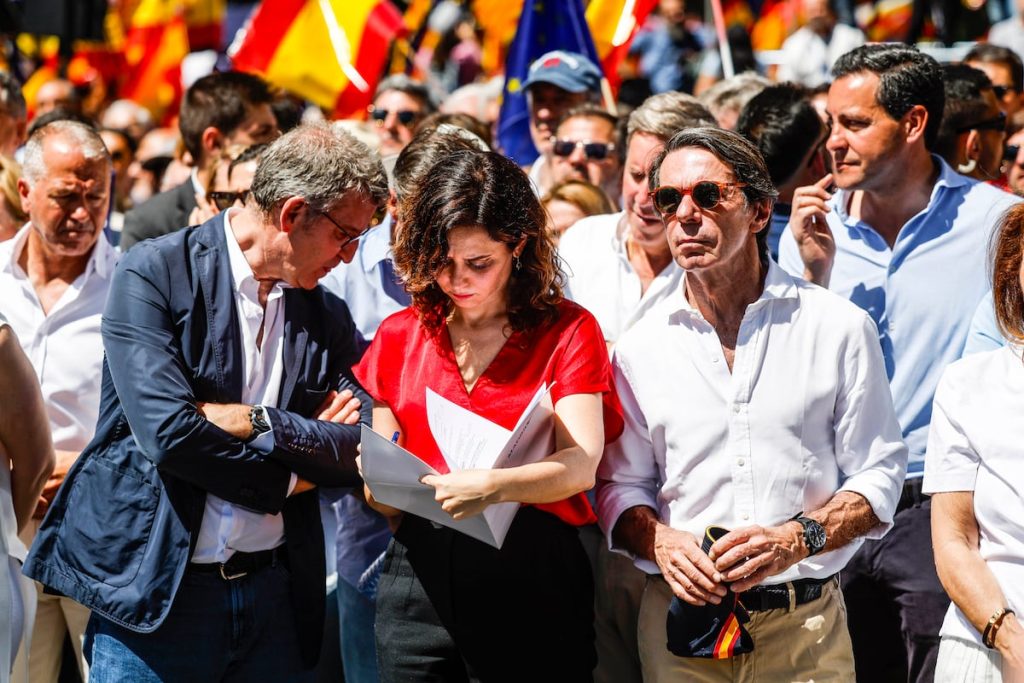Isabel Díaz Ayuso, president of the Community of Madrid, has decided not to attend the meeting called by Prime Minister Pedro Sánchez, in contradiction with the advice of her party leader, Alberto Núñez Feijóo. Feijóo had previously warned Ayuso that it would be a mistake for a president not to attend a meeting at La Moncloa, the presidential residence. Despite this, Ayuso has chosen to follow her own path and not attend the meeting with Sánchez. Feijóo had a conversation with Ayuso about her decision, and although he understands her reasons for not attending, he still believes it is a mistake not to answer the call of the head of government.
Ayuso explained her reasons to Feijóo for not attending the meeting at La Moncloa, citing the insults directed towards her and her partner by Sánchez. Despite Feijóo’s understanding of the situation, he maintains his belief that regional leaders should attend meetings with the president of the government. The Popular Party’s headquarters in Madrid is trying to balance not undermining Ayuso, with the party’s spokesperson Borja Sémper expressing his personal disagreement with Ayuso’s decision. Sémper stated that although he would have attended the meeting himself, he respects Ayuso’s decision, acknowledging her reasons for not attending due to the breakdown in the relationship between her and the president.
President of the Valencia Community, Carlos Mazón, expressed full support for Díaz Ayuso and criticized Sánchez for his disrespectful comments towards her and her partner. He defended Ayuso’s decision to not attend the meeting, citing the lack of minimum decorum and dignity in Sánchez’s actions towards her. Mazón stated that the political persecution directed at Ayuso is unacceptable, and publicly conveyed his support for her decision. Seven other regional leaders of the Popular Party have already attended meetings with Sánchez, including the presidents of Andalusia, Galicia, Aragon, La Rioja, Murcia, and Cantabria.
The decision by Ayuso to snub the Prime Minister not only goes against Feijóo’s advice, but also sets her apart from the other Popular Party regional leaders who have attended meetings with Sánchez. Ayuso’s argument for not attending the meeting at La Moncloa is based on her opposition to the government’s negotiations with Catalan separatist parties, which she views as detrimental to the rule of law, Spanish unity, and interregional solidarity. While Ayuso chose not to attend, some of her colleagues have highlighted the importance of meeting with the President and have described their meetings as positive experiences. Galician President Alfonso Rueda and Andalusian President Juan Manuel Moreno Bonilla both emphasized the personal and institutional obligation of regional leaders to engage with the head of government.
The escalation of insults between Ayuso and Sánchez, including accusations of corruption and wrongdoing, has fueled the tensions between the Community of Madrid and the central government. The refusal of Ayuso to attend the meeting with Sánchez reflects the strained relationship between the two leaders, with deep political divisions and personal animosity exacerbating the already contentious situation. Feijóo and other party leaders are trying to navigate this delicate balance of supporting Ayuso while promoting institutional norms and ensuring effective governance. Ultimately, the clash between Ayuso and Sánchez represents a broader political struggle within the Popular Party and the Spanish political landscape as a whole, highlighting the challenges of governing in a highly polarized environment.


